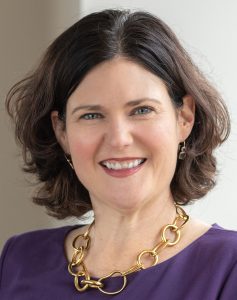Activists and other Texans opposed to a proposed Bible-based curriculum for public school children are becoming a concern for extremist Christians who support the material, said Amanda Tyler, executive director of Baptist Joint Committee for Religious Liberty.
BJC has joined with Christians Against Christian Nationalism, Texas Freedom Network, Texas Impact, the Anti-Defamation League Texas and Shalom Texas to defeat or rework the K-5 coursework under consideration by state education officials. Last month, the Texas Education Agency and the State Board of Education were deluged with written comments overwhelmingly opposed to the curriculum infused with conservative Christian theology and Scripture lessons.

Amanda Tyler
“A lot of these right-wing groups — Christian nationalist groups — were really concerned because evidently they got word from someone at the State Board of Education that there were 2,000 comments filed by those of us who were concerned about the curriculum, and only 200 comments filed by those who were supportive,” Tyler said during a recent webinar held to prepare opponents for the next phase of activism.
Their target is the proposed language arts and reading curriculum, which TEA introduced without disclosing the identity of the publisher or its cost. The material uses stories about biblical figures such as King David and Jesus to address academic subjects and in a way that depicts religious beliefs as facts while offering minimal and sometimes disparaging information about other world religions.
The curriculum is replete with overtly Christian and other biblical references commonly taught in churches, including “the Prodigal Son,” “the Good Samaritan,” “Solomon the Wise King” and “The Road to Damascus.” The Goldilocks fairy tale is used to teach children about the Sermon on the Mount and the Golden Rule.
“It’s clear … this curriculum heavily favors Christianity and presents religious claims in a very literalistic fashion to the youngest of our children, which turns public schools into Sunday schools,” said Mark Chancey, professor of religious studies at Southern Methodist University and an expert on the curriculum.
The religious intent of the material surfaced with the passage of a 2023 law that changed the way Texas approves public curricula and granted teachers who use state-approved teaching plans immunity from violations of the U.S. Constitution’s Establishment Clause.

Courtney Toretto
“So, organizations such as Texas Freedom Network, BJC, Texas Impact and ADL did a deep dive into the curriculum, and what we found was deeply troubling. We all have discovered a consistent pattern of religious insertion into the curriculum, specifically Christianity starting as young as kindergarten,” said Courtney Toretto, director of policy for the central division of ADL Texas.
A new report by the Texas Freedom Network Education Fund offered similar conclusions, adding the curriculum verges on being a tool for evangelism: “In addition to giving far more attention to Christianity than other religions, the curriculum verges on Christian proselytism. This issue contradicts the curriculum authors’ own claim that the inclusion of religious materials ‘is not for the purpose of advancing any particular religious belief.’”
The curriculum offers no justification for its promotion of Scripture in public education, the study added. “And they often do so without notifying parents that their children will be doing what at a minimum verges on Bible study more suited to Christian Sunday school than nonsectarian public schools.”
The prospect of a sectarian curriculum motivated BJC and its partner advocacy groups to encourage Texans to submit comments to the state. While those messages have not been made public, many writers shared their comments with advocates who in turn made them available to webinar attendees.
Tyler’s message focused on the curriculum’s misleading teaching on religious freedom during the nation’s founding.
“While religious freedom is certainly an important American ideal that is appropriate to teach, this curriculum overemphasizes its importance relative to other motivations for the colonists and freedoms sought in early American history,” she wrote. “The curriculum cherry-picks Founding Era history to tell a one-sided story that overstates the religiosity (specifically, Protestant Christianity) of the Founders while ignoring concerns about government intrusion into religion and the ‘no establishment’ principles that led to the First Amendment of the U.S. Constitution.”
The approach overlooks the role taxation without representation and living without democracy played in colonists’ desire to found the nation, Tyler said. “Religious freedom is an appropriate topic for study and should be explicitly linked to constitutional protections, including the First Amendment.”
One commenter said the curriculum lacks balance and fairness with regard to other faiths: “Texans do not want Christian lessons pushed through public schools. Teaching about world religions is one thing, teaching Christian Sunday school lessons is another. It is inappropriate to inject favoritism to Christian teachings via public school curriculum.”

Emily Bourgeouis
Another writer objected to teaching about the Sermon on the Mount and the Golden Rule in lessons about how to treat others: “Students do not need to understand specific religious terms like ‘sermon’ to meet the lesson objectives. While ‘sermon’ is used in Christianity, other religions use terms like ‘homily’ or ‘reflection.’ The concept of the Golden Rule and helping others can be taught without reference to Christianity.”
Just as objectionable is the curriculum’s insinuation that Jewish Scripture is subordinate to Christian Scripture and how that message may affect Jewish children across the state, said Emily Bourgeouis, public affairs director at Shalom Austin.
“Our community is really active on the issue in part because we know we are one of the communities who are going to be most affected by it,” she said.
The next step in opposing adoption of the curriculum will come Sept. 10 when the State Board of Education hears in-person comments on the materials, Tyler said. Guidelines for participation were shared during the webinar along with information on how to participate in a caravan to Austin the day of public comments. Texans also may email their state education board members directly.
BJC and its partner groups “have been working hard to make the democratic process easier and to help every Texan be able to express their opinions about this curriculum to the State Board of Education, who will vote on the curriculum in November,” Tyler said.
Related articles:
All 25 largest school districts in Texas reject school chaplains option
Proposed new Texas school curriculum infused with Bible stories
Oklahoma schools chief mandates Bibles in every public school classroom


